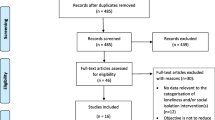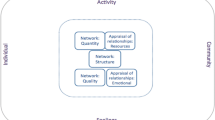Abstract
This article addresses the question of how to define, operationalize, and measure psychological and social well-being. Well-being is a concept central to successful outcomes in clinical social work practice, and its promotion is a goal of the profession, yet it is rarely taken into account when we develop evidence-based practices. The complexity of the construct has led to it being described in the literature as “unmeasurable” (Corlazzoli and White in Measuring the un-measurable: solutions to measurement challenges in fragile and conflict-affected environments. Department for International Development (DFID), London, 2013). This article describes and discusses a participatory study of 649 conflict-affected women in a post-conflict region of Northern Uganda that used grounded theory to define and operationalize this concept from the standpoint of women program participants for the purpose of future monitoring and evaluation. The results indicated that poor and often marginalized conflict-affected women were able to envision, articulate, and describe their future well-being, with implications for other populations experiencing severe adversity. The study resulted in the development of a practical method to evaluate the effectiveness of future programs from the standpoint of program participants.



Similar content being viewed by others
Notes
The study in Northern Uganda was part of a larger one, involving 1,298 conflict-affected women in Burundi, Nepal, and Northern Uganda (Bragin et al. 2014a). The complete report is available from CARE Austria at http://care.at/images/Dokumente/CARE_3_Country_Study_To_Be_Well_at_Heart.pdf.
The focus groups for the study were limited to women who participated in some form of solidarity group, to ensure that personal needs could be identified and handled immediately and followed up over the long term by qualified personnel. This condition was required by the Ugandan Joint Clinical Research Center Aggregated Institutional Review Board as well as the Institutional Review Board of Hunter College, CUNY. All research documents and protocols received prior approval from both of these bodies.
Three men participated in the focus groups. One was a village cultural leader who had joined a related “men’s awareness” program, another was an elected leader who wanted to observe the proceedings, and the third was a disgruntled community member who happened to be around during the focus group and asked to sit in. None of these men participated in concept validation. Three men, senior Acholi religious and cultural leaders, were included as key informants. Their names were put forward by the women who respected them as people who could help fill in the study’s knowledge gaps.
A manual for adapting the methods used in this article is available online from CARE International at https://care.at/images/expert/pdf/COE_Resources/Psychosocial/The_SEE_PET_for_Women.pdf.
References
Ager, A., Ager, W., Stavrou, V., & Boothby, N. (2011). Inter-agency guide to the evaluation of psychosocial programming in emergencies. New York, NY: UNICEF.
Ainsworth, M. (1967). Infancy in Uganda: Infant care and the growth of love. Baltimore, MD: Johns Hopkins University.
Allen, J. (2005). Coping with trauma: Hope through understanding (2nd ed.). Washington, DC: American Psychiatric Publishing.
Amone-P’Olak, K. (2005). Psychological impact of war and sexual abuse on adolescent girls in Northern Uganda. Intervention: International Journal of Mental Health, Psychosocial Work and Counselling in Areas of Armed Conflict, 3(1), 33–45.
Anand, P., Hunter, G., & Smith, R. (2005). Capabilities and well-being: Evidence based on the Sen-Nussbaum approach to welfare. Social Indicators Research, 74, 9–33.
Annan, J., Blattman, C., Mazurana, D., & Carlson, K. (2011). Civil war, reintegration, and gender in northern Uganda. Journal of Conflict Resolution, 55(6), 877–908. doi:10.1177/0022002711408013.
Baines, E. (2008). Demobilization, disarmament and reintegration (DDR): The case of mothers in northern Uganda. Post-Conflict Peacebuilding: Connecting Research and Policy, 2. Retrieved from http://www.carenepal.org/publication/_CARE_NepalWomenPsychosocialWellbeing_2013%202.pdf.
Book review. [Review of the book Culture, religion and the reintegration of female child soldiers in Northern Uganda.]. Intervention: International Journal of Mental Health, Psychosocial Work and Counselling in Areas of Armed Conflict, 10(1) 81–83
Bragin, M. (2004). The uses of aggression: Healing the wounds of war and violence in a community context. In B. Sklarew, S. Twemlow, & S. Wilkinson (Eds.), Analysts in the trenches: Streets, schools and war zones (pp. 169–194). Hillsdale, NJ: Analytic Press.
Bragin, M. (2012). So that our dreams will not escape us: Learning to think together in time of war. Psychoanalytic Inquiry: A Topical Journal for Mental Health Professionals, 32(2), 115–135.
Bragin, M. (2014). Clinical social work with survivors of disaster and terrorism: A social ecological approach. In J. Brandell (Ed.), Essentials of clinical social work (2nd ed., pp. 366–401). Thousand Oaks, CA: Sage.
Bragin, M., Onta, K., Taaka, J., Ntacobakinvuna, D., & Eibs, T. (2014a). To be well at heart: Women’s perceptions of psychosocial well-being in 3 conflict-affected countries – Burundi, Nepal, and Uganda. Intervention: International Journal of Mental Health, Psychosocial Work and Counselling in Areas of Armed Conflict, 12(2), 171–186.
Bragin, M., & Opiro, G. (2012). Making the right to education a reality for war-affected children: The Northern Uganda experience. International Journal of Applied Psychoanalytic Studies, 10(3), 158–177.
Bragin, M., Taaka, J., Ntacobakinvuna, D., & Adolphs, K. (2014b). Ex-combatant women envision psychosocial well-being in Burundi and Northern Uganda. Peace and Conflict.
Bukuluki, P., & Mugisha, J. (2010). Baseline survey for Roco Kwo Programme. Kampala, Uganda: Care International. in Uganda.
Conceicao, P. & Bandura R (2008). Measuring Subjective Well-being: A summary review of the literature. Office of Development Studies: United Nation Development Program: New York.
Corlazzoli, V., & White, J. (2013). Measuring the un-measurable: Solutions to measurement challenges in fragile and conflict-affected environments. London, England: Department for International Development (DFID).
Coulter, C., Perrson, M., & Utas, M. (2008). Young female fighters in African wars. Stockholm, Sweden: Nordiska Afrikainstitutet.
CSWE (Council on Social Work Education). (2008). Educational Policy and Accreditation Standards. Author. Retrieved from: http://www.cswe.org/File.aspx?id=41861
Diener, E., Helliwell, J. F., & Kahneman, D. (2010). International differences in well-being. New York, NY: Oxford University Press.
Estes, R. J. (1993). Toward sustainable development: From theory to practice. Social Development Issues, 15(3), 1–29.
Gamble, D. (2012). Well-being in a globalized world: Does social work know how to make it happen? Journal of Social Work Education, 48(4), 669–689.
Healy, L. (2012). Measuring social well-being. In L. Healy & R. Links (Eds.), Handbook of International Social Work: Human rights, development and the global profession (pp. 417–423). Oxford, UK: Oxford University.
Hobfoll, S., Watson, P., Bell, C., Bryant, R., Brymer, M., Friedman, M. J., et al. (2007). Five essential elements of immediate and mid-term mass trauma intervention: Empirical evidence. Psychiatry, 70(4), 228–315.
Honwana, A. (1999). Challenging western concepts in trauma and healing. Track Two: Culture and Conflict, 8(1). Retrieved August 30, 2010, from http://196.25.102.27/archive/two/8_1/p30_collective_body.html.
Horn, R. (2009). An evaluation of the Kakuma emotional well-being interview. Intervention: International Journal of Mental Health, Psychosocial Work and Counseling in Areas of Armed. Conflict, 7(3), 223–328.
Horn, R. (2013). Psychosocial distress and well-being among Acholi women in Northern Uganda. Washington, DC: World Bank Group.
Inter-Agency Standing Committee (IASC). (2007). IASC guidelines on mental health and psychosocial support in emergency settings. Geneva, Switzerland: Author.
Jordon, B. (2007). Social work and well-being. Lyme Regis, UK: Russell House Publishers.
Klasen, S. (2007). Gender-related indicators of well-being. In Mark McGillivray (Ed.), Human Well-Being: Concept and Measurement (pp. 167–193). London: Palgrave.
Loughry, M., & Eyber, C. (2003). Psychosocial concepts in humanitarian work with children: A review of the concepts and related literature. Washington, DC: The National Academies Press.
Maeland, B. (2010). Culture, religion and the reintegration of female child soldiers in Northern Uganda. New York: Peter Lang.
McGillivray, M. (2007). Human well-being: Issues, concepts and measures. In M. McGillivray (Ed.), Human wellbeing: Concept and measurement. London: Palgrave Macmillan.
McKay, S. (2004). Reconstructing fragile lives: Girls’ social reintegration in northern Uganda and Sierra Leone. Gender & Development, 12(3), 19–30.
Nagpal, R., & Sell, H. L. (1985). Subjective wellbeing. New Delhi, India: WHO Regional Office for South-East Asia.
Nussbaum, M. (2003). Capabilities as fundamental entitlements: Sen and social justice. Feminist Economics, 9(2/3), 33–59.
Padgett, D. K. (2008). Qualitative methods in social work research (Vol. 36 (2nd ed.). Thousand Oaks, CA: Sage.
Psychosocial Working Group. (2003). Psychosocial intervention in complex emergencies: A conceptual framework. Retrieved from http://www.forcedmigration.org/psychosocial/PWGinfo.htm.
Republic of Uganda. (2007). Peace, Recovery And Development Plan for Northern Uganda [PRDP]: 2007–2010. Kampala, Uganda: Author.
Robeyns, I. (2003). Sen’s capability approach and gender inequality: Selecting relevant capabilities. Feminist Economics, 9(1), 61–92.
Ryff, C. D. (1989). Happiness is everything, or is it? Explorations on the meaning of psychological well-being. Journal of Personality and Social Psychology, 57(6), 1069–1081.
Sell, H. L., & Nagpal, R. (1992). Assessment of subjective well-being: The Subjective Well-Being Inventory (SUBI). New Delhi, India: WHO Regional Office for South-East Asia.
Sen, A. (1985). Well-being, agency and freedom: The Dewey lectures 1984. The Journal of Philosophy, 82(4), 169.
Sen, A. (1999). Development as freedom (p. 194). New York: Anchor Books.
Tol, W., & van Ommeren, M. (2012). Evidence-based mental health and psychosocial support in humanitarian settings: Gaps and opportunities. Evidence-Based Mental Health, 15, 25–26.
Ungar, M. (2012). The social ecology of resilience: A handbook of theory and practice. New York: Springer.
Werner, E. E. (2002). Looking for trouble in paradise: Some lessons learned from the Kauai Longitudinal Study. In E. Phelps, F. F. Furstenberg, & A. Colby (Eds.), Looking at lives: American longitudinal studies in the twentieth century (pp. 297–314). New York, NY: Russell Sage Foundation.
Wessells, M. (2009). What are we learning about community-based psychosocial protection mechanisms: An interagency review of the evidence from humanitarian and development settings. Washington, DC: The Save the Children Fund.
White, S., & Pettit, J. (2007). Participatory approaches in the measurement of human well-being. In Mark McGillivray (Ed.), Human Well-Being: Concept and Measurement (pp. 240–269). London: Palgrave.
Acknowledgments
This article is based the findings of a study funded by a grant from CARE Austria. The authors are grateful to the leadership and staff of CARE Austria and CARE International in Uganda for their support for the study, without which it would not have been possible.
Author information
Authors and Affiliations
Corresponding author
Additional information
The full study, To be well at heart: Conflict-affected women’s perceptions of well-being: A participatory study in Burundi, Nepal, and Northern Uganda is available at http://care.at/expert/coe-resources/psychosocial.
Rights and permissions
About this article
Cite this article
Bragin, M., Taaka, J., Adolphs, K. et al. Measuring Difficult-to-Measure Concepts in Clinical Social Work Practice Operationalizing Psychosocial Well-Being Among War-Affected Women: A Case Study in Northern Uganda. Clin Soc Work J 43, 348–361 (2015). https://doi.org/10.1007/s10615-014-0507-0
Published:
Issue Date:
DOI: https://doi.org/10.1007/s10615-014-0507-0




